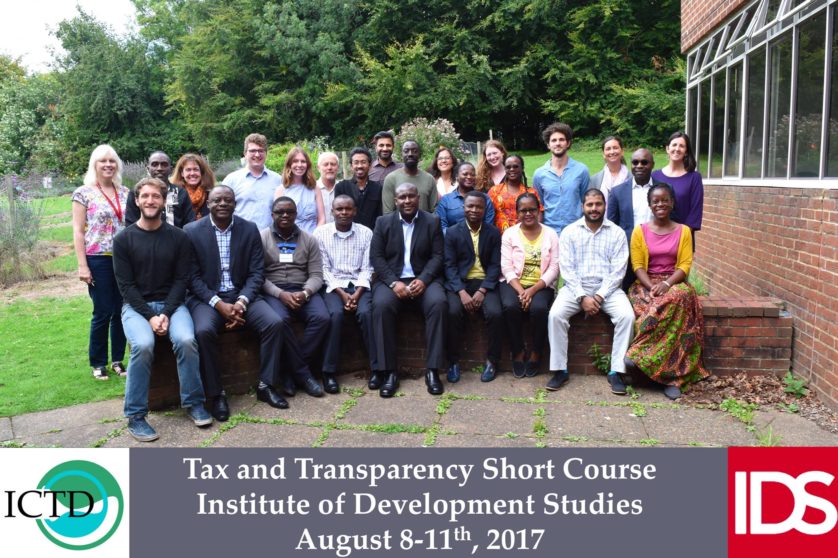The ICTD is pleased to annouce a new four-day course on Taxation and Transparency to be held at the Institute of Development Studies from August 8-11th.
The Topic: There is now very substantial and growing interest in tax transparency as an important element of policy-making in developing countries. Greater transparency is believed to be an important component – or even a prerequisite – for more effective tax systems. However, there are many underdeveloped and conflicting meanings of transparency and how it affects different aspects of taxation. We know that we do not fully understand what kinds of transparency are really needed in the tax field. The purpose of this short course is, therefore, in part to tap wider knowledge and experience and develop a common agenda. The course focuses on what we perceive as major dimensions of transparency in taxation and raises questions about the meanings and implications of transparency. It will address questions such as: What does transparency mean in practice? What kinds of information are most useful for transparency? What is the role of different actors in promoting tax transparency?
Intended Audience: The course targets a broad, interdisciplinary group of participants who are involved in tax issues. Participants are envisaged to include individuals from international aid organisations, government agencies, civil society organisations, revenue authorities, academia, and private foundations. The course is also relevant for tax practitioners and researchers who are interested in identifying transparency concerns relating to tax systems.
Trainers: The facilitators for the course are internationally recognised experts in taxation with a mix of excellent research and teaching records as well as extended practical experience in developing countries. The confirmed facilitators are Mike Durst (ICTD and tax attorney), Mick Moore (IDS/ICTD), Alex Cobham (Tax Justice Network), Giulia Mascagni (IDS/ICTD), Martin Hearson (London School of Economics), Denis Mukama (Rwanda Revenue Authority), Vanessa van den Boogaard (ICTD/University of Toronto) and Waziona Ligomeka (IDS/former Principal Economist in Malawi’s Ministry of Finance).
Course Content
Introduction to taxation and transparency
- What are the existing debates on taxation and transparency?
- What does transparency mean in practice?
- What kind of information is most useful for transparency?
Understanding base erosion and profit shifting as a consequence of lack of transparency
- An examination of how governments and multinational corporations have tacitly cooperated in making BEPS structures possible and examination of the pressures of tax competition that have led to this phenomenon
- How the lack of visibility has contributed to the growth of BEPS transactions over the decades
- The role of country-by-country reporting including its historic development, controversies and criticisms
- The OECD standard on country-by-country reporting in relation to the wider debate
- The emerging public database on country-by-country reporting and the tools being developed to help various users to take advantage of the new transparency
- Whether OECD’s proposals (particularly with respect to the measurement of BEPS in the future) might succeed in mitigating the lack of transparency
- Consideration of whether alternative models of corporate taxation, like the Destination-Based Cash Flow Tax, might affect the nexus between tax transparency and policy-making
Transparency and natural resource extraction
- The role of transparency in the negotiation and administration of fiscal deals between developing countries and extractive companies
- A review of some of the efforts by the Extractive Industries Transparency Initiative (EITI) to promote greater transparency in dealings between governments and extractive companies
- Other initiatives that promise to increase transparency for future progress
Transparency and tax treaties
- The use of tax treaties as the building blocks of the international tax regime
- The processes of treaty negotiation and ratification
- Analyzing mutual agreement procedures and tax treaty arbitration
- Exchange of information provisions of tax treaties (versus other international agreements)
Country practices relating to the coding and analysis of tax return data
- An analysis of how revenue authorities collect and maintain their taxpayer databases
- Difficulties experienced by revenue authorities in monitoring and managing data
- Measures that might be effective in remedying current difficulties
- The usefulness of tools such as the Tax Administration Diagnostic and Assessment Tool (TADAT)
Critically analysing the burden of taxation
- An analysis of corporate tax rates in Ethiopia and their impact on small, medium and large firms
- The burden of taxes on poor people: Case studies of Sierra Leone and the Democratic Republic of Congo
- The Institute of Fiscal Studies’ tax and benefit model: How do we examine the impact of fiscal changes? A UK case study
Cost: £900 – This includes tuition fees, course materials, lunches, refreshments and one group dinner. It does not cover accommodation, insurance or travel costs.
See here for details on the application procedure and to fill out the online application form. The deadline for applications is May 31st.
